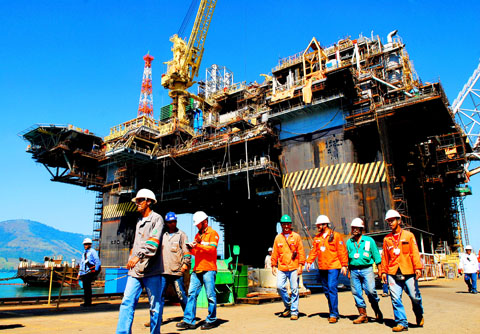Oil prices tumbled more than US$6 a barrel on Friday — the biggest one-day percentage plunge in nearly four years — after a rebounding dollar and a Russian troop pullback in Georgia sparked another frenzied sell-off.
Crude’s nosedive wiped out all the gains from the previous day’s big rally and reaffirmed the belief that high energy prices are still cutting into consumer demand for fossil fuels in the US and overseas.
Light, sweet crude for October delivery fell US$6.59, or 5.43 percent, to settle at US$114.59 a barrel on the New York Mercantile Exchange. It was crude’s largest single-day price drop percentage-wise since Dec. 27, 2004, when prices dropped 6.47 percent.

PHOTO: BLOOMBERG
In dollar terms, it was oil’s steepest one-day slide since Jan. 17, 1991, just after the start of the Gulf War. Crude prices had risen for three straight days, including an almost US$6 rally on Thursday.
In London, October Brent crude fell US$6.24 to settle at US$113.92 a barrel.
“This is extreme volatility,” said Jim Ritterbusch, president of energy consultancy Ritterbusch and Associates in Galena, Illinois. “The fact that we erased all of yesterday’s gains so fast suggests that we’re still in a bear market. There’s just not much demand out there.”
Crude’s violent fall accelerated throughout the day on renewed bullishness in the dollar and an apparent easing of geopolitical tensions.
On Thursday, worries about Russian hostilities helped push crude prices up US$5.62 to US$121.18, crude’s highest settlement price in more than two weeks.
“Obviously, yesterday’s rally was overcooked and we’re simply taking back some of that speculative risk premium we injected into the market,” Ritterbusch said.
Russian troops began withdrawing from key Georgian positions on Friday, the day the pullback was to be completed under a US-backed ceasefire. Oil traders were still eyeing the conflict amid concerns that another flare-up of violence could sever key oil shipments bound for Western countries.
“It’s still speculative whether Russia will use oil as a weapon to punish the West,” said Victor Shum, an energy analyst with Purvin & Gertz in Singapore. “But it has certainly focused the market on that geopolitical threat.”
Meanwhile, London-based BP PLC last week shut down its Baku-Supsa oil pipeline — which runs through the center of Georgia from Baku in Azerbaijan to Supsa on Georgia’s Black Sea coast — because of security concerns.
The line, which has a 150,000-barrel-a-day capacity, had recently been pumping around 90,000 barrels a day, a BP spokeswoman said.

WAITING GAME: The US has so far only offered a ‘best rate tariff,’ which officials assume is about 15 percent, the same as Japan, a person familiar with the matter said Taiwan and the US have completed “technical consultations” regarding tariffs and a finalized rate is expected to be released soon, Executive Yuan spokeswoman Michelle Lee (李慧芝) told a news conference yesterday, as a 90-day pause on US President Donald Trump’s “reciprocal” tariffs is set to expire today. The two countries have reached a “certain degree of consensus” on issues such as tariffs, nontariff trade barriers, trade facilitation, supply chain resilience and economic security, Lee said. They also discussed opportunities for cooperation, investment and procurement, she said. A joint statement is still being negotiated and would be released once the US government has made

NEW GEAR: On top of the new Tien Kung IV air defense missiles, the military is expected to place orders for a new combat vehicle next year for delivery in 2028 Mass production of Tien Kung IV (Sky Bow IV) missiles is expected to start next year, with plans to order 122 pods, the Ministry of National Defense’s (MND) latest list of regulated military material showed. The document said that the armed forces would obtain 46 pods of the air defense missiles next year and 76 pods the year after that. The Tien Kung IV is designed to intercept cruise missiles and ballistic missiles to an altitude of 70km, compared with the 60km maximum altitude achieved by the Missile Segment Enhancement variant of PAC-3 systems. A defense source said yesterday that the number of

Taiwanese exports to the US are to be subject to a 20 percent tariff starting on Thursday next week, according to an executive order signed by US President Donald Trump yesterday. The 20 percent levy was the same as the tariffs imposed on Vietnam, Sri Lanka and Bangladesh by Trump. It was higher than the tariffs imposed on Japan, South Korea and the EU (15 percent), as well as those on the Philippines (19 percent). A Taiwan official with knowledge of the matter said it is a "phased" tariff rate, and negotiations would continue. "Once negotiations conclude, Taiwan will obtain a better

FLOOD RECOVERY: “Post-Typhoon Danas reconstruction special act” is expected to be approved on Thursday, the premier said, adding the flood control in affected areas would be prioritized About 200cm of rainfall fell in parts of southern Taiwan from Monday last week to 9am yesterday, the Central Weather Administration (CWA) said. Kaohsiung’s Taoyuan District (桃源) saw total rainfall of 2,205mm, while Pingtung County’s Sandimen Township (三地門) had 2,060.5mm and Tainan’s Nanhua District (南化) 1,833mm, according to CWA data. Meanwhile, Alishan (阿里山) in Chiayi County saw 1,688mm of accumulated rain and Yunlin County’s Caoling (草嶺) had 1,025mm. The Pingtung County Government said that 831 local residents have been pre-emptively evacuated from mountainous areas. A total of 576 are staying with relatives in low-lying areas, while the other 255 are in shelters. CWA forecaster